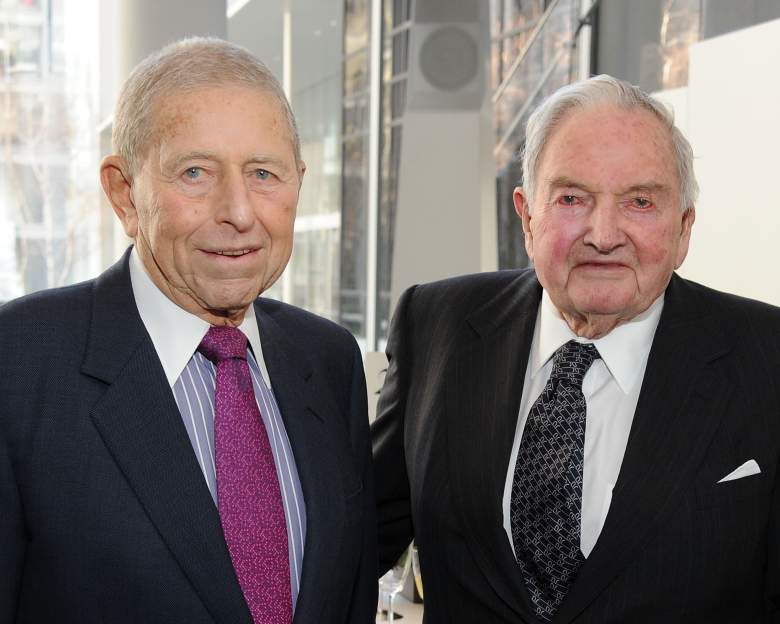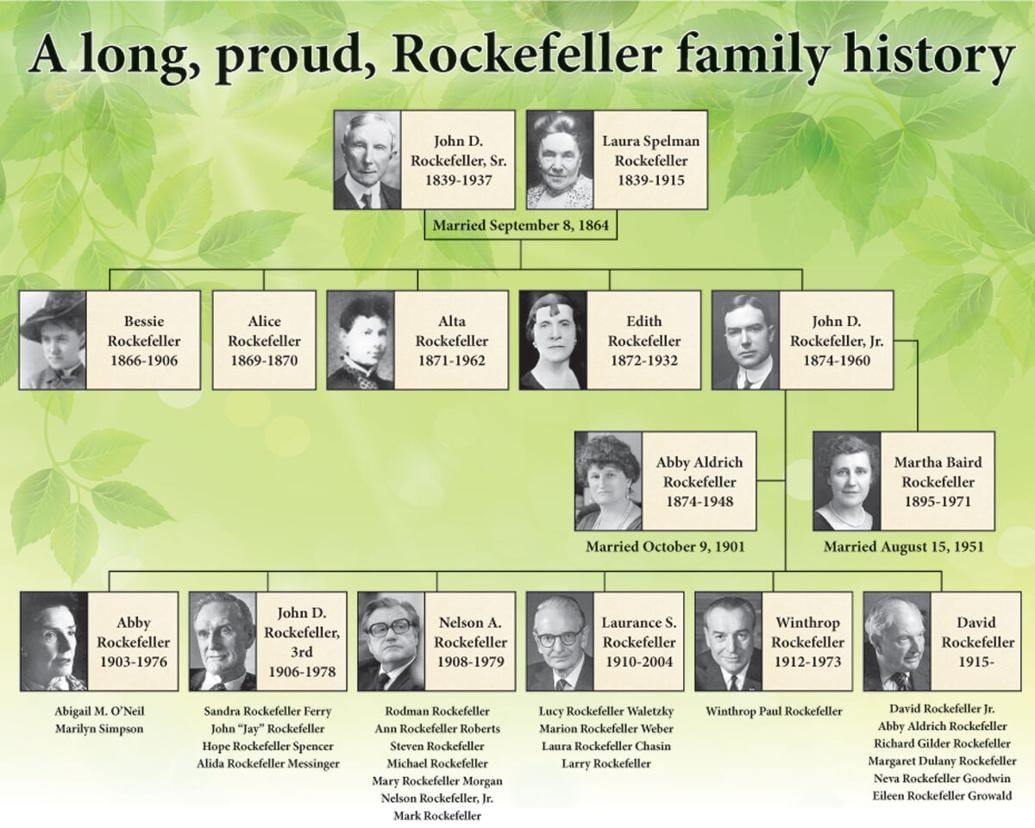Unveiling The Rockefeller Legacy: Wealth, Philanthropy, And More
How does a family, generation after generation, maintain and even grow its wealth in the face of economic shifts, global conflicts, and the inevitable passage of time? The enduring legacy of the Rockefeller family, a name synonymous with immense wealth and impactful philanthropy, offers a compelling case study in the dynamics of generational wealth building.
The narrative begins in the early 17th century, when the ancestors of the Rockefeller family immigrated to America from Germany. They initially settled in Philadelphia, a city that would serve as the backdrop for the family's early experiences in the New World. However, the family's story would ultimately take root in New York, where William Avery Rockefeller Sr., born into a modest family, would become a pivotal figure in shaping the future of the dynasty. His son, John D. Rockefeller, would later become a titan of industry, forging a fortune in the burgeoning American petroleum industry during the late 19th and early 20th centuries. The brothers John D. Rockefeller Jr. primarily through Standard Oil would establish the family's dominance in the business world.
The Rockefeller family, now 200 members strong and with a cumulative net worth of $10.3 billion according to Forbes, is more than just a symbol of wealth; it is a testament to strategic investment, adaptability, and a commitment to philanthropy. The family's success is a result of both a keen understanding of the business world and a dedication to giving back to society. One notable example is David Rockefeller, the last surviving Rockefeller brother, who passed away in 2017 at the remarkable age of 101. His life, like that of the family, showcased a blend of business acumen and a commitment to the public good.
The family's influence extends beyond their vast fortune. The Rockefeller Foundation, the Rockefeller Brothers Fund (established in 1940), and the Rockefeller Family Fund (established in 1967) have all played key roles in addressing global challenges. These organizations reflect the family's long-standing commitment to making a positive impact on the world.
| Full Name | David Rockefeller |
| Born | June 12, 1915, in New York City, New York, U.S. |
| Died | March 20, 2017 (aged 101) |
| Parents | John D. Rockefeller Jr. and Abby Aldrich Rockefeller |
| Spouse | Margaret McGrath (m. 19401996) |
| Children | Six |
| Education | Harvard University (B.A.), University of Chicago (Ph.D.) |
| Profession | Banker, Philanthropist |
| Career Highlights | CEO and Chairman of Chase Manhattan Bank |
| Philanthropic Activities | Chairman of the Board of Trustees of the Museum of Modern Art,Chairman of the Rockefeller University,Active in the Trilateral Commission |
| Net Worth at Death | $3.3 Billion |
| Notable Achievements | Served as a key advisor to U.S. presidents, including Eisenhower, Kennedy, and Nixon;Significant contributor to international relations and global philanthropy. |
| Reference | Encyclopedia Britannica |
The Rockefeller name has become synonymous with wealth, power, and philanthropy. John D. Rockefeller, the patriarch of the family, was the worlds first billionaire. When adjusted for inflation, his fortune would exceed $400 billion, making him the richest person in modern history. The family's enduring success is a testament to their ability to adapt and diversify their investments. Beyond oil, the Rockefeller family expanded into railroads, banking, and real estate. The family's wealth continues to be passed down through generations, a fact that demonstrates their understanding of generational wealth building. This is further supported by the establishment of Rockefeller Capital Management (RCM) in 2018, an independent wealth management and financial services firm.
The Rockefeller legacy is not just one of immense wealth. The familys philanthropic deeds are as equally recognized as their fortune, with significant contributions across various sectors. John D. Rockefeller personally gifted $500 million to charities, demonstrating the family's commitment to giving back. Beyond the initial industries that built their fortune, the family expanded their investments into areas like railroads, banking, and real estate, further solidifying their financial position.
As the world grapples with its challenges, the Rockefeller family's long-standing commitment to philanthropy serves as an example. The establishment of the Rockefeller Foundation, the Rockefeller Brothers Fund, and the Rockefeller Family Fund underscores the family's dedication to using their resources to address global issues. Their influence on banking and finance is matched by their contributions to the arts, education, and global health.
The ability to maintain and grow wealth over several generations requires a multifaceted approach. The family's success in the American petroleum industry during the late 19th and early 20th centuries, primarily through Standard Oil, was just the beginning. The Rockefeller family then expanded their investments, spreading their assets across various sectors and creating a diversified portfolio. This diversification enabled them to navigate economic downturns, technological advancements, and geopolitical shifts.
The family has also used various financial tools to perpetuate their wealth. Whole life insurance is one such tool. Business moguls like John D. Rockefeller built fortunes using whole life insurance, and they used their insurance policies to pass on wealth that has lasted for generations. This approach, which is still used today, allows for tax advantages and helps fund business expenses.
Rockefeller Capital Management (RCM) is a key example of how the Rockefeller family continues to manage its wealth. RCM is an independent wealth management and financial services firm, launched in 2018. The firm provides a wide range of services, including investment advisory, asset management, and fiduciary activities. RCM's existence emphasizes the ongoing efforts of the family to manage and grow its wealth.
The family's wealth and impact are evident in many ways, from their generational wealth building to their commitment to philanthropic initiatives. Today, the Rockefeller family continues to uphold its legacy of success and generosity. The family is not the richest family in America, but they still have substantial wealth. The family's fortune is estimated to be worth over $10.3 billion today, demonstrating their continued success in the modern economy. They maintain a strong bond and preserve the wealth they have. This focus on legacy and values has helped the family stay united through generations.
Axiom Wealth Partners of Rockefeller Global Family Office is dedicated to managing the complexities of family and wealth. Their focus is on providing comprehensive financial services, navigating the complexities of family dynamics, and ensuring that the values and goals of the Rockefeller family are preserved for future generations. They have a strong mission to serve families.
The Rockefellers' story offers a valuable insight into how families can build and sustain wealth across generations. Their success is a result of a combination of business acumen, adaptability, financial innovation, strategic investment, and philanthropic endeavors. The continued emphasis on legacy and values has helped maintain a strong bond within the family.
The Rockefellers have used a range of strategies, including strategic investment and philanthropic initiatives. Their dedication to giving back to society has not only helped them improve the world, but it has also strengthened their reputation and influence. This, in turn, has reinforced their financial standing. The family's commitment to philanthropy and investment in new industries helped ensure that their wealth continued to grow.
The Rockefeller family is really rich and well-known for their immense wealth. The family is not the richest family in America anymore, but they still have a lot of money, and no one can deny that. The wealth accumulated during the 19th and 20th centuries by John D. Rockefeller Sr. continues to influence modern philanthropy and business practices.
The continued success of the Rockefeller family serves as a case study in the enduring power of generational wealth. Their story is a testament to their ability to adapt and thrive in an ever-changing world. The values of John D. Rockefeller have been passed down through generations.


